Friday, 28 June 2019
Shining Song Starnova Review (English Original Visual Novel)
This summary is not available. Please
click here to view the post.
Friday, 21 June 2019
2019 Steam Curator Wrap-Up – Half of the Year Edition (Snowed IN; The Great Voyage; Manna for our Malices; Lyantei; Courage for a Kiss)
Hello and welcome to this year’s first EVN Chronicles Steam Curator Wrap-Up, where I look at the games that were sent to me in the past six months through Steam’s Curator Connect, but were either too small to warrant a full review, or I simply couldn’t cover them in detail due to time constraints. When I first did this kind of posts last year (you can check them out here: Part 1, Part 2), some of the games featured there waited extremely long for being covered. Because of this, I’ve decided that from this point forward, I’ll make this a twice-a-year event, being sure that every VN given to me gets its space on the blog within a reasonable time period. As always, I’m extremely thankful to all the developers that send me their work for assessment and it saddens me whenever my impressions are negative. I hope, however, that the feedback I can offer will be valuable to them, while believe it’s my duty to my readers to warn them against buying a game I find lacking. So, setting the introductory drivel aside, I hope you enjoy this brief overview of these four interesting VNs sent to me during the first half of 2019!
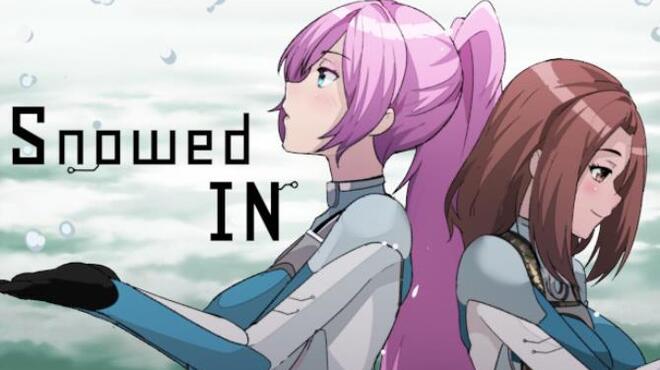
Snowed IN is an unusual yuri nukige, focusing on pair for soldiers in the distant future, where cybernetic enhancement of the human body has reached incredible levels of sophistication. The protagonist, Sigma, is an experienced spec-ops officer who has modified her body to the point where little of it remains organic. For an infiltration mission against a cell of anti-augmentation radicals, she’s assigned with a fresh, talented recruit – a full “natural” named Linde, whose presence in the military is connected with an affirmative action plan for those not augmented. The two polar-opposite individuals, both through their background and attitudes, have to work together to survive the extremely dangerous assignment – and the mission itself hides even more threats and twists then the initial setup would suggest.
Sounds intriguing? It surely does, but the fact this is a nukige, and a very short one at that (up to an hour and a half of content), should be taken into account when setting your expectations. The game explores its main themes rather briefly, often switching to sex scenes that are only vaguely justifiable in the context of the tense plot – the writing and main intrigue are solid, but simply too rushed to provide a compelling narrative. There are also some highly-questionable elements to it, especially in the rather distasteful bad ending – that’s definitely one point at which h-content was very unnecessary, even if those scenes are the “main point” of the game. As a piece of yuri smut in an unusual setting, it's definitely not the worst thing around – just don't expect anything more than that.
Final Rating: (Cautiously) Recommended
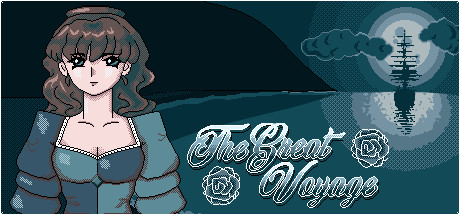
The retro-inspired, pixelart VN The Great Voyage is definitely the best piece of literature among the titles listed in today's post, despite being the shortest one out of them all. This kinetic novel, with only around an hour of content, tells the story of three refugees from a city sacked by a ruthless rebel army. Stuck on a fleet of ships escaped from the carnage, now desperately looking for a new home and avoiding inevitable pursue by the enemy, the three protagonists (young noblewomen Eugenie, a melancholic poet Vassan and a con-artist posing as a foreign ambassador, Memnon) have to cope with their new situation, the loss they experienced and even the sins of their pasts. All this leads to a highly-compelling narrative about vastly different individuals trying to survive against all odds, find a new meaning to their lives and manoeuvring events mostly outside of their control – a deeply un-heroic and rather pessimistic scenario, that nonetheless feels interesting and genuine just because of how imperfect and often powerless its main characters are.
The story is presented with simple, but highly stylized art that greatly fits its gloomy climate (and the same can be said about the game's eerie soundtrack). Its main downside is, obviously, the tiny length of the whole experience (thankfully the pricing is appropriately scaled, with the game costing $2 both on Steam and Itch.io), but I can't say it left me unsatisfied in any major way. It did a surprisingly good job at both developing the main characters and resolving their arcs, and even creating an interesting and believable setting for their stories to play out in. The premise obviously held the potential to expand into a much grander tale, but it's not something I could seriously hold against The Great Voyage – it's simply a great short story that I can recommend wholeheartedly to anyone that looks for a satisfying literary experience in their VNs above anything else.
Final Rating: Highly Recommended

Today's Steam is full of extremely simple VNs that are put on the platform as cash-grab shovelware, early experiments with VN-making software or even straight-up trolling. And while Manna for our Malices might look like it belongs to one of those categories, with its simplistic visuals and over-the-top writing, there’s actually much more to it. In this short time-looping story, you take control of Ai, a foul-mouthed high school girl who, for an unknown reason, is killed by a knifer while coming back home after lessons, only to wake up in at the beginning of the same day. Throughout the game, you’ll go through this loop dozens of times (quite often with Ai commenting angrily about her poor luck), slowly uncovering the underlying conspiracies and the roles the protagonist and people around her play in the whole intrigue. With every new piece of information, the already-visited locations will provide new clues and new dialogue options will appear, until you’re ready to solve the puzzle and break Ai out of the endless cycle of waking up and being murdered.
The game, for the most part, does a really good job of implementing this concept, at least before the very last stretch – I had to consult the walkthrough to reach the true ending and I’m not sure I’d ever come up with the solution the VN expected me to find otherwise. The characters are heavily exaggerated, being either complete weirdos or walking anime tropes (this includes the protagonist and her closest friend Aoi, who’s a “deredere childhood friend” archetype on steroids). The humour is crude but effective, and after getting into the story I was strangely invested in solving the overall puzzle, while the “true” conclusion was properly fun and cheesy. The game play’s a lot on anime clichés, with an obvious understanding of the medium, which helps in making its visuals and writing seem like a deliberate choice, rather than just amateurishness. The end effect is trashy for sure, but strangely captivating – I had a lot of fun going through the various stages of the intrigue and uncovering layers upon layers of mystery beneath the at first mundane-looking setting. For this, I can quite confidently recommend giving Manna for our Malices a chance – although, for the amount of content it offers, the $5 asking price is just barely acceptable.
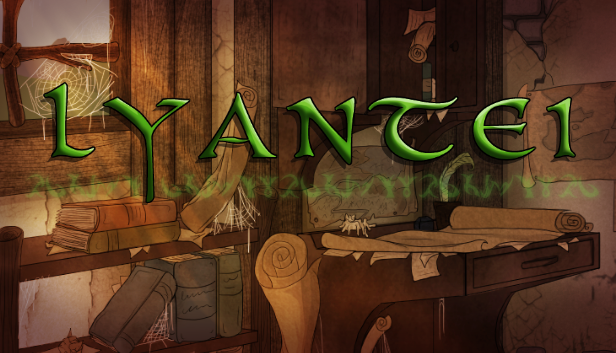
Lately, I’ve grown weary of tackling stat management games, as over time I find more and more of them pointlessly tedious and boring, with “simulation” aspects rarely being compelling and mostly distracting me from the parts of the game I’m actually interested in, that is, the story. Still, in the case of Lyantei, I think my biases are among the lesser reasons for which I did not enjoy playing it. At first glance, this story of a young girl/guy (you can choose the protagonist’s gender, which mostly affects the romance options available to you) traveling to a distant inn owned by their aunt, in order to help her pay off a debt seems like something I’d enjoy – more casual, slice-of-life stories in a fantasy setting are still a bit underexplored niche and offer great potential. The production values of the game, while simple, were also not bad enough to discourage me – I can put up with anything that isn’t straight-up ugly if what I read is interesting enough.
Sadly, in Lyantei there’s barely any interesting narrative to speak of – the character arcs are incredibly cliched, which is only made worse by the awkward English writing and the protagonist who just comes out as pushy and weird, sticking his/her nose into everyone's business without any real reason. The game is also very short, which makes all the character arcs feel incredibly rushed. The romance especially comes pretty much out of nowhere, while lack of proper CGs make the story feel empty like few other VNs I’ve played. On top of that, the structure of the game drove me to utter frustration – to get into each hero/heroine arcs you have to stumble upon them early on, by doing various chores at the inn at the right moments. Absurdly-enough, the triggers lead to these scenes are quite obscure and it’s easy to miss most of the story in each of your runs. I see absolutely no logic behind that choice and with no guide available, I ended up dropping Lyantei without finishing all the routes, which I do very rarely, especially with games I receive review copies for. Little good can also be said about stat-management itself, which is basic and functional, but not in any way interesting. Your only goal is to earn enough money in 30 days to pay off your Aunt’s debt, by helping around the inn and selling potions you make with your alchemy skills, but with the short span of the game and no meaningful side objectives, there’s actually very little to it.
In the end, while I feel that Lyantei is not an awful game at its core, it just doesn’t represent the quality I’m looking for in a commercial product and can’t recommend buying it under any conditions. If it was a free VN, with some additional polish and tweaks I could still consider it worth trying out – however, I don’t think the developer will be able to fix it enough to justify putting a price tag on it, and especially the $9 one it currently has. Maybe on their next try…
Final Rating: Not Recommended

Mikołaj Spychał is a Polish VN developer that has recently released his second attempt at creating a perfectly-generic high school romance VN (after his debut Jake's Love Story and a quite unfortunate journey to the world of catgirls in the form of his second title, Nekokoro). And while you're probably thinking now that more cookie-cutter, teenage love stories is the last thing our niche needs, there are still things to appreciate in Courage for a Kiss, at least from the perspective of its author's growth. The main storyline here involves the protagonist and four girls somewhat reluctantly banding up to create a school play for a regional contest – the play itself is an interesting storytelling gimmick, as its content and the roles particular characters will perform depend on some of your choices. These changes are particularly fun to observe between routes, just as are minor variations in the dialogue that reflect your previous choices and the information you learn about the girls in different paths. While other than that the heroines and their stories are utterly generic and even a bit too similar to each other, this attention to detail makes the setting feel a bit deeper than you'd expect.
Visually the game is simple, but pleasant to look at and is undeniably a huge improvement over this dev's earlier projects, with decent, mildly animated sprites and high-quality backgrounds. However, it suffers from a single, borderline-fatal flaw – an utter lack of proper CGs, which takes away quite a lot of impact from crucial moments in the story. The music is good for the most part, but sometimes kicks in a bit too strong, distracting from the scene rather than supporting it. All-in-all, it's a competent and reasonably satisfying, even if very basic and tame romance VN, and if you for some reason feel like reading another one of those, there are definitely worse options out there.
Final Rating: (Cautiously) Recommended
There weren't many “must reads” among the shorter VNs sent to me in the last few months, but I can’t say they didn’t offer surprises – the one game that I actually expected the least from, Manna for our Malices, managed to be the most enjoyable among them and something I wouldn’t mind seeing more of in the EVN scene – a witty play on the formula that didn’t treat itself seriously, but still strived to tell a fun story and surprise the reader with its twists. This kind of fun factor is what both Snowed IN and Lyantei visibly lacked, making them much more forgettable by the result. The Great Voyage, on the other hand, reminded me that VNs can be great not only as full-fledged video games, but also as a form of illustrated literature – focusing on a really compelling narrative is often worth a lot more than gameplay gimmicks and branching paths, then it goes to satisfaction you gan from the whole experience. And for the meantime, I hope you all enjoyed this little post – if the games that get sent to me warrant it, the next one will show up in December. You can also expect full-on reviews of larger games given to me through Steam Curation – I’ve received review copies of some very interesting titles, both new and old, that I really want to give the spotlight to. Have a great weekend everyone!
Friday, 14 June 2019
EVN Chronicles' NaNoRenO 2019 Highlights, part 2

Welcome to the second and final part of EVN Chronicles’ NaNoRenO 2019 coverage (if you missed the first part, you can find it here), where I’m going through my highly subjective picks from this year’s submissions to the biggest annual visual novel game jam. While I don’t think any of the games listed this time could seriously threaten the position of Mnemonic Devices as my personal “winner” of the event, there are at least two worth giving closer attention to – Monochrome Blues, which is another excellent story tackling the topics of grief and depression (even though it adds a much more questionable sci-fi subplot to the mix) and Cooked With Love, which stood out with excellent sense of humour and compelling mix of comedy and smart SoL content. Of course, every VN featured here gets my genuine recommendation and I think they’re all worth the humble amounts of time they require to fully read through – especially considering that, once more, they’re all absolutely free and clicking the titles on the list will lead you straight to DRM-free downloads on itch.io. So, let’s find out what else NaNoRenO participants have prepared for us!

OS-simulation games, where you interact with a story through an imitation of a computer interface, have a pretty rich history in NaNoRenO, with Christine Love’s Digital: A Love Story being probably the best-known example. While RE:BURN is not the most innovative or intricate iteration of this formula, it tells an intriguing, short story using UI of an e-mail client and an online communicator, and the mechanics of deleting or replying to messages instead of typical dialogue choices. The protagonist, a female student who took up a job as an editor in her college’s scientific journal, is tasked with clearing out old emails from the paper's official account. As the messages slowly synchronise, she starts uncovering more and more strange correspondence and even starts receiving popup messages from someone claiming to be her predecessor at the editorial job, giving her borderline-incomprehensible warnings – and whether she listens to them might have some serious and unpredictable consequences.
RE:BURN’s intrigue is not particularly deep or memorable, but where the game truly shines is in its inclusion of various writing styles, unique to every character in the story and creating a sense of danger and urgency despite the rather static manner in which you interact with it. I would love to see more interactivity or some Easter eggs hidden within its Windows-like interface, but even as it is now, it’s definitely worth your attention for its brief, 30-40 minute runtime.
Rating: Recommended

While at first Monochrome Blues looks like a simple story about artist’s block and finding inspiration, it features many twists and surprising elements that leads it into a direction that is pretty much impossible to fully anticipate. Although I have some issues with how the plot developed later on, the overall experience of playing through it and reaching the true ending was excellent, especially due to its more down-to-Earth and emotional story elements. Maja, the burned-out storybook author starting a new job in a preschool after months of deep depression is interesting and likeable, while the descriptions of her grief, lack of inspiration and struggle with simply keeping up with everyday life are believable and compelling. The five four children she takes care of are similarly charismatic, with their drawing sessions and conversations with Maja being among the clear highlights of the game. With a pleasant artstyle and overall solid writing, it’s a small treat that everyone should seriously enjoy… At least if you can forgive some over-the-top twists, that will seriously challenge your suspension of disbelief.
Rating: Highly Recommended

Cooked with Love is a somewhat ironic VN about a messy college student (you can choose their gender and name) trying to prepare an ad-hoc dinner for their crush, after their wallet, along with the money for their date, mysteriously vanishes. The first part of the game consists mostly of a mini-game, where the protagonist tries to combine the underwhelming selection of ingredients they were able to find in their house (which they share with two other students), without a real clue what they’re doing, as they have no experience in cooking whatsoever. Then, they have to decide whether to go on with the date, or rather cancel it altogether and share the miserable results of their work with their roommate, Brooks. This creates two brief routes, with multiple possible outcomes depending on your “cooking” and dialogue options you choose.
While relatively short and simple, the game charms with its humour and witty dialogue – the overall silliness of the story is coupled with characters that are exaggerated, but ultimately likeable and relatable in some ways, to a rather compelling effect. I've had quite a lot of fun exploring different, desperate "dishes" you can prepare with ingredients such as old instant noodles and an egg salad stolen from your roommate, and the dialogue they provoke after being presented to protagonist's date. The "right" dish & dialogue combination that will lead you to optimal results are sometimes quite hard to find, but it only takes a bit of patience to crack the "puzzle" by trial and error. The visuals are stylish, making for a really nice overall package – definitely one of the best games in the event and one you shouldn't miss out on.
Rating: Highly Recommended

Robot Daycare is a short (about 1,5h of reading) story primarily about friendship and dealing with loss, but adds a very interesting twist in form of an AI observing the three main characters’ crumbling relationship and learning either the best or the worst of human nature, depending on player’s choices. The AI – a robot created as a college project by the said group of friends shortly after their roommate committed suicide, might witness them either coming to terms with the tragedy they went through and reconcile after a period of denial and shifting blame, or tear each other apart with accusations and hateful outbursts. The former scenario will lead you to a heartwarming and SoL-focus good route, while the latter will quickly devolve into a full-on horror story.
This seamless fusion of genres is Robot Daycare’s most unusual feature and one of the main things that make it worthwhile, but the general quality of the writing and the game’s visual aesthetic are not bad either (although the art is simple and somewhat cartoonish, and the default resolution of the game is quite low, making it run in a rather tiny window). While I didn’t enjoy some of the overly-optimistic developments in the good route, the drama the game portrayed and its both positive and negative consequences were quite compelling to read through. The same can be said about an AI trying to comprehend human emotion and going haywire is a few different ways because of that – this might not be the best implementation of that idea that I’ve seen, but still one definitely worth experiencing.
Rating: Recommended

Npckc is an author that uses simple art and stories to tackle the issues of otherness, prejudice and discrimination. A Hero and a Garden is one of the larger and more interesting attempts on their part, subverting the traditional trope of a knight rescuing a kidnapped princess from an evil witch. Our protagonist, who tried to be a hero like the ones from the medieval epics, ends up in humiliating captivity, cursed by the witch to help restore the monster village he destroyed during his misguided rescue attempt. While he tends to magic plants growing incredibly potent “berries” (this introduces a simple, clicker gameplay mechanic), he interacts with inhabitants of the village, the princess and eventually the witch herself, learning that nothing is as simple as he thought (while we learn the surprising nuances and tragic elements of his own backstory).
While the message of tolerance is just as present here as in other npckc’s games, A Hero and a Garden makes an especially interesting commentary on how social expectations and roles we are assigned to by others shapes our lives and perspectives. Its simplicity makes it the kind of game I would love to see presented to children and talked about in classes, but even for an adult reader it’s a nice, casual experience, with enough thought-provoking and creative elements to be worth investing an hour or so into.
Rating: Recommended
And this concludes my NaNoRenO coverage for this year. Last time, due to RL issues, I didn’t get to wriote about the event at all and it was a really fun experience to go through all those wildly different, creative games that often stay heavily underappreciated just because of how crowded and relatively niche the jam is. I hope my highlights convinced at least some of you to give these VNs a chance. I’d also like to give shout out to two games that narrowly didn’t make it to the list: Mikomi Kisomi’s Alice in Stardom, which offers a fun, but slightly shallow story about chasing your dreams against all odds and HitOrMissy’s Fetch Quest, which won me over with its humour and fun approach to “fantasy” storytelling, but disappointed with its lack of sound and music.
So, thank you all for going with me on the journey through this year’s NaNoRenO VNs! I hope I’ll be able to repeat this after the next edition of the jam and be sure to look out for my Yuri Game Jam summary later this year – that event is something I’ll never skip on, as long as my blog is active. Have a great weekend everyone!
Friday, 7 June 2019
DoraKone! My Sweet Summer Adventure Review (Free Yuri Visual Novel)
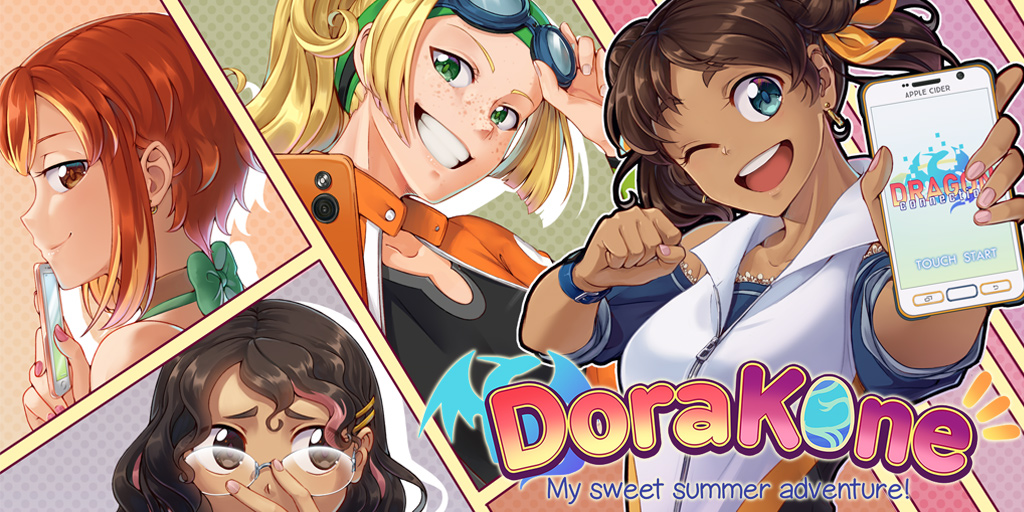
While it’s easiest to find high-quality free EVNs during popular game development events such as NaNoRen0 and Yuri Game Jam, from time to time there are small gems that pop up more or less out of nowhere, created either by hobbyists or as side projects by veteran developers without any particular occasion. One of the most interesting (even if infrequently active) collectives that created this kind of games in the past few years is Apple Cider, a team co-founded by DejiNyucu, a Chilean artist known for her distinct and high-fidelity character art. Over the last 10 years, she was involved in numerous visual novel projects developed under various labels, including my all-time favourite erotic VN, Cute Demon Crashers. This personal fondness of her work made me that more excited when I randomly discovered Apple Cider’s latest release, free yuri VN called DoraKone! My Sweet Summer Adventure.
Released on Steam in December 2018 despite its summer theme, DoraKone! is an extremely cute, comedic GxG romance VN. It features four girls that meet and befriend each other over a dragon-themed, Pokemon GO-style augmented reality game Dragon Connection (DraCo for short), all of this in an unusual setting of an unnamed Chilean town. The energetic protagonist, Dulce, is a newbie that starts her adventure with DraCo after buying a new smartphone and quickly encounters three more experienced players: shy and kind Rayen, rash and competitive Brin, and spoiled rich girl Honorée. Depending on your choices and meeting events you pick, Dulce will get closer to one of the heroines, becoming a close friend with her, or even something more, while also either winning or losing the DraCo tournament held in her town. This creates over twelve possible endings, nearly all of them wholly pleasant and lighthearted.
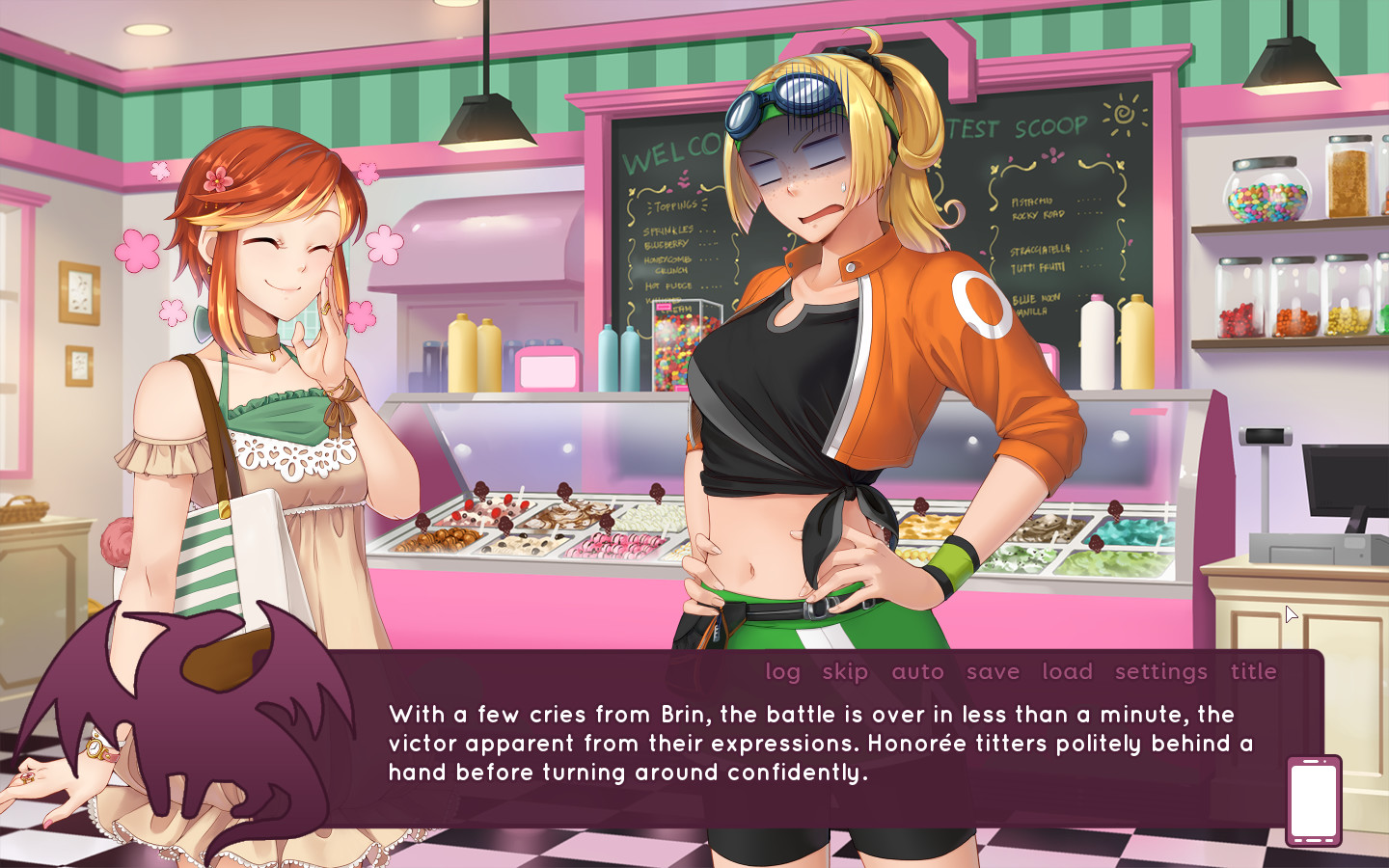
Detailed and expressive character designs, along with beautiful CGs accompanying every ending are definitely among DoraKone!'s greatest assets
While undeniably short (2-3 hours of reading), DoraKone! is both fun and to-the-point, spending most of its time fleshing out the main characters and tying their personalities to their playstyles within the aforementioned AR game: the elements heroines use, their attitude towards competitive play and the means they use to reach their goals are all major parts of their characterisation. Dulce, on the other hand, is in DraCo mostly to have fun and make friends, so she can easily adapt her playstyle and attitude. At the same time, she's not in any way a blank character – her cheerful and energetic attitude can be borderline-overwhelming, but it makes her proactive enough to quickly win over the other girls and help them deal with any problems and doubts that surface during the story. The romance arcs can feel rushed due to the overall short length and multi-route structure of the game, but they don't come out of nowhere and the plot presents the bond that builds between the characters quite well. They all learn about their sexual orientation in casual conversations (without any pandering/forced dialogue) and get closer to each other over time, but especially in the weeks before the tournament, when Dulce is training for doubles matches with her partner of choice. This is also the portion of the game where some mild conflict/drama kicks in, but this only serves to show the characters growing to understand each other better and becoming more in-synch. In the end, DoraKone! can hardly be described as a deep, story-driven experience, but it's still one that is very decently written and plays its cards well – it will disappoint you if you're looking for more than just brief romantic fluff, but is top-class in its own category.
Visually this VN is an excellent experience, full of personality and charm, but also detailed and vibrant just like most of Deji's work. Designs of the girls immediately communicate their defining traits: the fancy and elaborate style of Honorée, sporty and quirky look of Brin, and modest, cute appearance of Rayen, along with their very distinct body languages, clearly show who you're dealing with from the moment you meet them for the first time. Many expressions and gestures are purposefully exaggerated, feeding into the comedic climate of the story, but not to the point of making the characters feel like plain caricatures – their mannerisms and behaviour are often goofy, but rather believable and the occasional heartfelt moments make them feel authentic. Similarly positive things can be said about CGs, which are relatively few (around a dozen), but very gorgeous and impactful – it was quite a while since a yuri kissing scene made me want to squeal quite like some of those in DoraKone!, especially Rayen and Honorée ones (I know, I'm gross, but I'm completely OK with that).
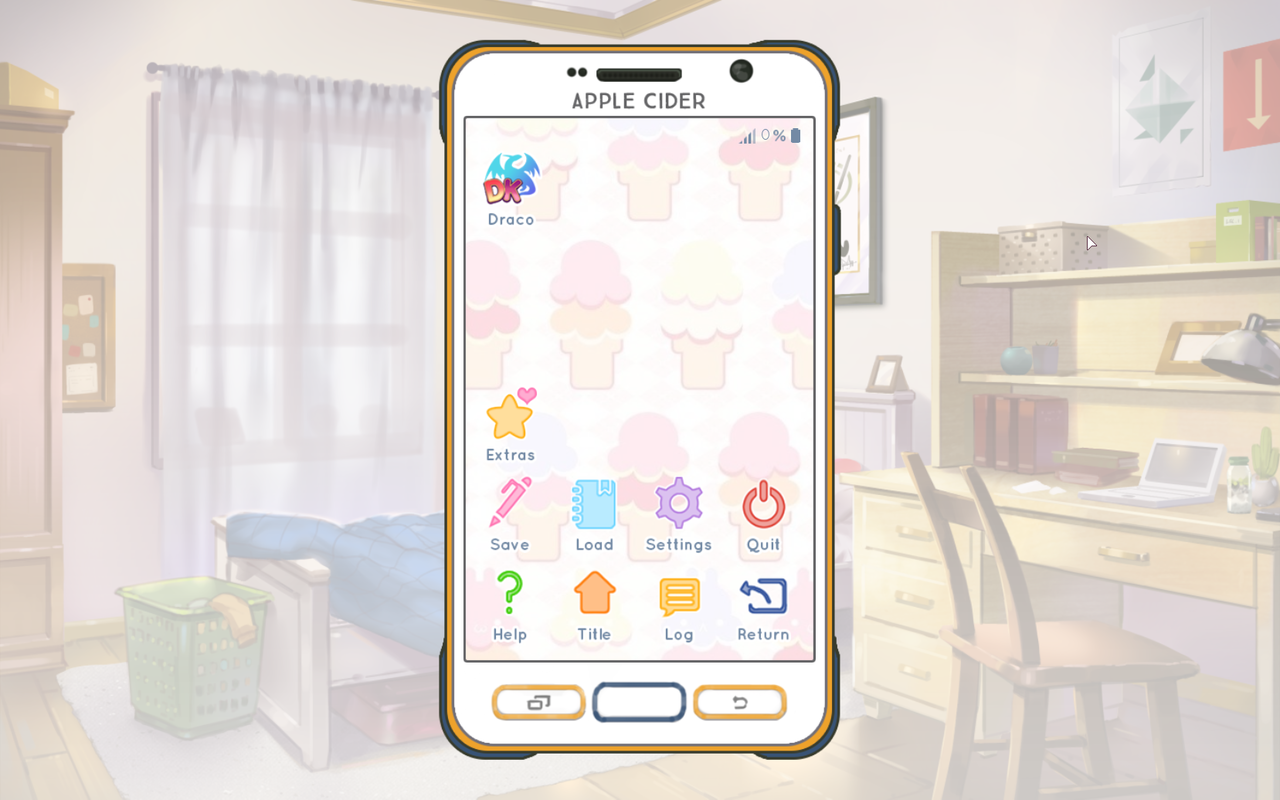
The highly-stylized UI enhances the game’s climate, but is also functional enough to make as easy to navigate as your typical Ren’py game
The other assets, such as the user interface, with menus stylised to look like a smartphone screen and backgrounds (though admittedly there's just a couple of locations throughout the game) are also of top quality. The interface itself is stylish, but very easy to get used to and offers all the quality of life features you'd expect from a Ren'Py VN. Music is just as energetic and upbeat as the story itself, standing out a bit more than ambient tracks in this type of game usually would, but hardly in a bad way.
One thing that I particularly enjoyed in DoraKone!, and on which I partially touched earlier is the fact that it's consistently wholesome and relaxing to read, while also not completely devoid of substance and steady plot progression. Even the friendship endings, while they require you to choose a suboptimal path with the heroine (skipping on some interactions with her or choosing wrong dialogue options), don't really feel like lesser conclusions and reward you with gorgeous, unique CGs. Outside of the scenario where you go into the tournament solo and fail to create a strong bond with any of the girls, every path leaves you with something to enjoy and offers satisfying narrative results. This makes DoraKone! one of the most consistent feel-good VNs I've read in a while – if that's the kind of experience you're looking for, this is a game I would easily recommend buying for 5-8 dollars. For free, however, there's simply no reason to not check it out – if fluffy yuri romance fits even marginally within your pool of preferred VN themes, by all means, give it a try. Also, be sure to follow Apple Cider’s upcoming commercial project, Caramel Mokaccino. If the quality of this team’s freeware games is any indication, it’s going to be quite a treat.
Final Score: 3,5/5
Pros:
+ Great visual design
+ Fun and likeable heroines
+ Clever and consistently funny writing
Cons:
- Short
- Rather basic plot
VNDB Page
Play DoraKone! for free on Steam or Itch.io
Subscribe to:
Comments (Atom)
